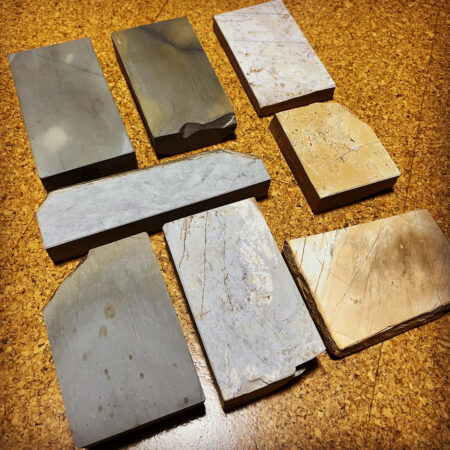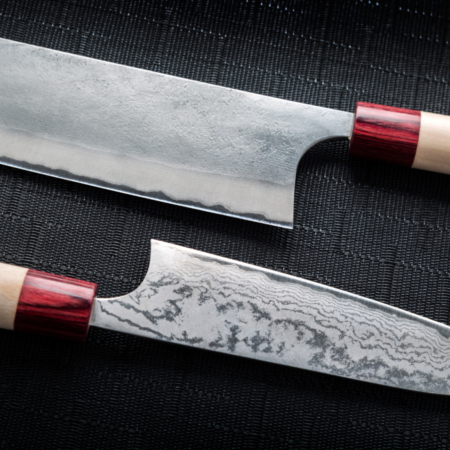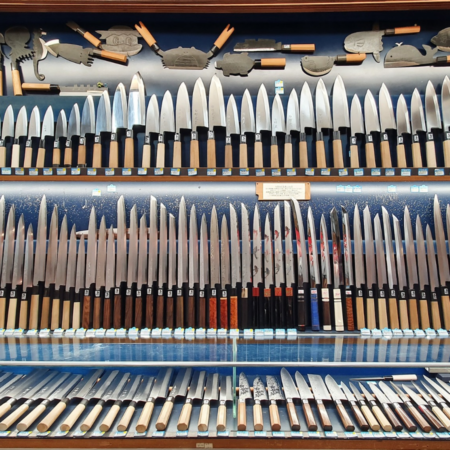When purchasing natural sharpening stones, avoid buying from secondhand sites like auction platforms and flea market apps. These sites often feature counterfeit products, sometimes even passing off regular bricks as authentic stones by stamping them with labels like "Masamoto-yama" or "Nakayama." Due to the appealing low prices, many buyers are misled into thinking they've found a great deal and make impulsive purchases. For this reason, it is highly recommended to visit a trusted store in person or buy from well-known online shops to avoid disappointment and ensure authenticity. Even when purchasing online, choosing reputable shops allows you to ask for advice beforehand, thus minimizing the risk of ending up with a product that doesn't meet your expectations. This advice extends beyond sharpening stones to include knives and other kitchen tools. A handful of customers have brought items purchased online into knife specialty stores for consultation, which isn't always practical. If you're that concerned, it's best to avoid purchasing from uncertain sources altogether. Buying from professionals means paying for their expertise, knowledge, and trustworthiness, which justifies the higher prices. However, if you insist on buying cheaply, do so at your own risk.
Chapter 1 : Avoid Buying from Secondhand Sites
Avoid Buying from Secondhand Sites
Chapter 2 : They May Not Suit Your Preferences
They May Not Suit Your Preferences
One of the fascinating yet challenging aspects of natural sharpening stones is that no two stones are exactly alike, even if they come from the same quarry or stratum. While stones from the same source may share similar characteristics, their sharpening feel can differ significantly. If synthetic stones are likened to well-behaved children, natural stones can be seen as more temperamental and unique. This variability can make them difficult to handle for both sellers and buyers. For instance, a stone that works well with one type of knife may not perform as expected with another. Furthermore, over time, a stone may reveal poor-quality layers that affect its performance. Each stone has its own hardness and abrasive power, which can make it better suited for specific tasks, such as honing the cutting edge, flattening the blade, or polishing to a fine finish. This complexity means that while natural stones can offer a unique and rewarding sharpening experience, they may also present challenges and require a lot of experimentation and adaptation. For true enthusiasts who enjoy exploring the nuances of different stones, this can be an exciting journey. However, for most people, investing in such variable and often expensive stones might not be practical. If you want to avoid the risk of getting a stone that doesn't meet your needs, it's best to buy from a store that allows you to test the stone before purchasing. If you have the budget and enjoy the unique qualities of natural stones, experimenting with various types can be a rewarding experience.
Chapter 3: Consider the Storage Environment
Consider the Storage Environment
Natural sharpening stones are more susceptible to deterioration compared to synthetic stones. After use, especially in winter, it's crucial to dry them thoroughly before storage. Residual moisture can freeze and expand, causing the stone to crack. Even with proper storage, stones can unexpectedly develop cracks or break in half. To prevent these issues, consider coating the sides and bottom of the stone with cashew lacquer. This protective layer prevents water absorption from the sides and enhances durability, ensuring the stone remains intact for longer. Given the high cost of many natural stones, it is worth taking extra care to preserve them.
Chapter 4: Why Natural Sharpening Stones are Worth It
Why Natural Sharpening Stones are Worth It
Despite their potential drawbacks, natural sharpening stones remain popular due to their unique advantages. One significant benefit is their ability to produce a sharper edge than synthetic stones. The abrasive particles in natural stones are less hard and have shapes that create finer scratches on the metal surface. This results in a smoother edge that causes less damage to food cells. Another appeal of natural stones is their ability to polish blades to a beautiful finish. The softer abrasives in natural stones can create a more aesthetically pleasing result compared to synthetic stones. When sharpening 2layers blade, natural stones can create a clear demarcation between the soft and hard metals, enhancing the blade's visual appeal. This quality is particularly valued in traditional Japanese knives and swords, where the contrast between the hard and soft metal is visually highlighted. The ability to achieve such a finish is a testament to the unique properties of natural stones, which cannot be replicated by synthetic stones.
Overall, while natural sharpening stones may present certain challenges, their unique benefits make them highly valued by those who appreciate fine craftsmanship and superior performance. Understanding these characteristics and taking proper care can help you make the most of these exceptional tools.







